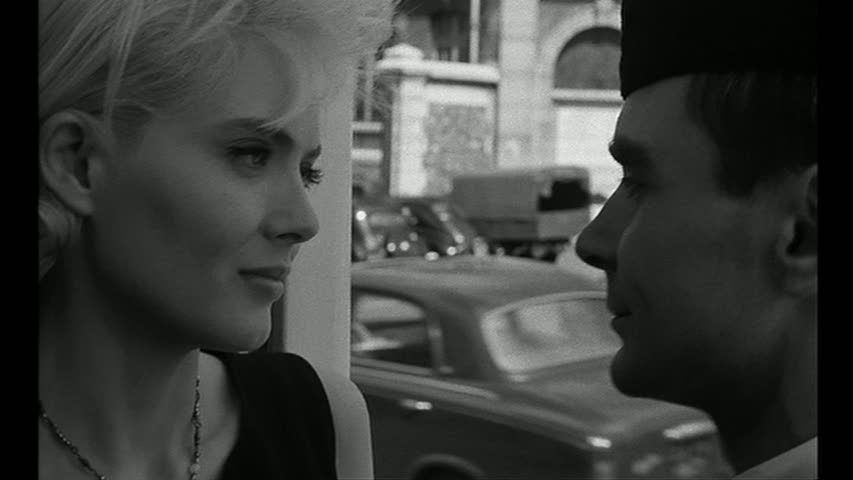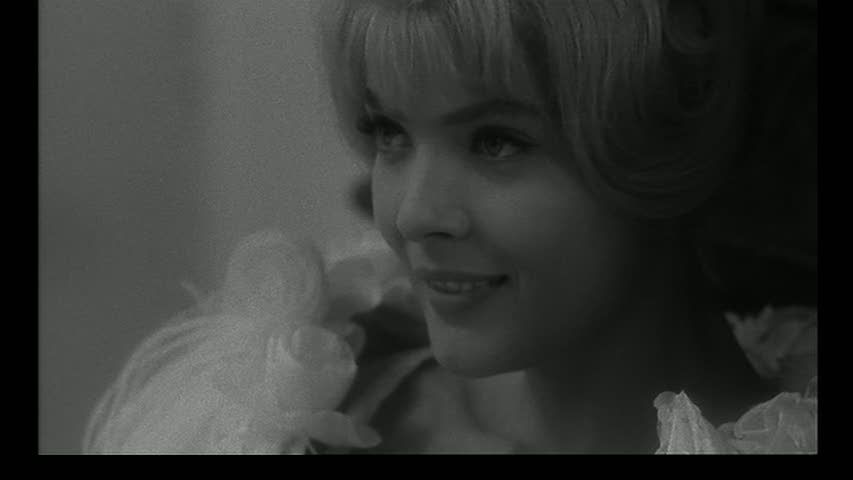
Agnès Varda's iconic heroine Cléo (Corinne Marchand) is a young woman, a fledgling pop singer, who wanders around Paris one evening while anxiously awaiting the results of a test for cancer; she fears she's ill and is going to die. And yet despite her melancholic mood, Varda's Cléo From 5 To 7, the record of those two nervous hours condensed into a mere hour and a half, is as light and sprightly as the elegant shawls and airy dresses the stylish Cléo dons over the course of the film. Cléo is a flighty, unstable girl — her friends are continually calling her "capricious," not without justification — with a real streak of vanity and egoism. She loves her own looks, loves to admire her face in mirrors, loves to shop not so much for what she buys as for the pleasures of trying things on, modeling for herself. Varda patiently indulges Cléo's mood swings and whims, simply following the girl around, twirling the camera in playful circles around her as she shops, bickers and teases with her friends and lover, then wanders through the streets of Paris, passing the time until her test results are ready.
Seldom has self-absorption been so charming and attractive. Cléo is reminiscent of the inward-looking protagonists of Varda's first film, La Pointe-Courte, the troubled lovers who are oblivious to everything but their own problems. But Cléo is a much more appealing figure: she's clever and has an unpredictable spirit that makes her fun to watch even when she's doing little besides whining about her own problems. Marchand's performance is subtle and endearing, infusing Cléo's bubbly air-headedness with an undercurrent of sadness and regret, a desperate fear of death that she tries to cover up with games and distractions. During a scene with her musician friends Bob (composer Michel Legrand) and Plumitif (Serge Korber), Cléo bounces erratically from annoyance to delight to depression, culminating in a wonderful shot where she sings a maudlin ballad that the duo wrote for her. Varda's camera, which had been frenetic throughout the scene, jumping around like an excited puppy from one face to another, now slows into a stately tracking shot, circling around Cléo, ending in a head-on closeup of the singer, her pale face isolated in a field of black, as tears run down her cheeks. It's an especially poignant moment because Varda allows it to arise naturally from out of the jovial spirit of the rehearsal session, an unexpected turn into bathos as Cléo's mind turns once again towards her uncertain fate.
Varda's style is continually calling attention to itself in disruptive ways, the calling card of the Nouvelle Vague, but unlike Varda's contemporary Godard, whose disjunctions were initially motivated by economy and expedience, Varda's seem more purposeful. One gets the sense in Godard's films from around this time that his stylistic flourishes are often there for their own sake, for fun, while Varda's style — though equally active — seems more directly motivated by the needs of the story. Early on in the film, after Cléo goes to see a fortune teller who delivers a foreboding vision of the future, an image of the girl walking down the stairs stutters and skips so that her blank, shaken face shifts out of and then back into the frame several times before finally being allowed to descend out of view. The effect is of holding a closeup without actually holding it, accentuating the girl's face and her stunned reaction to the fortune teller's confirmation that things are not looking good. Elsewhere, Varda's jittery jump cuts recall Breathless in the way they subtly shorten a scene, eliding a few seconds here and there as though speeding up time. Godard himself appears (along with Anna Karina) in a film-within-the-film segment, as a hammy silent actor in a short film that Cléo and her friend Dorothée (Dorothée Blank) go to see one afternoon. The short is in fact Varda's own Les fiancés du pont Mac Donald, a tribute to silent comedy in which Godard plays a man who sees the world as miserable and negative when he puts on a pair of dark sunglasses, only to recover his happiness once he takes them off.

The inclusion of this short is appropriate for a film that's all about the importance of one's outlook, one's way of looking at the world. Cléo's self-absorbed perspective isolates her, keeps her from recognizing the happiness in the world around her, keeps her from engaging with her fellow beings. During her travels, she walks into a café and winds among the tables, looking at people and picking up snatches of conversation here and there. Throughout the film, when the curious Cléo engages in this kind of nonchalant eavesdropping and spying, Varda spies along with her: the camera roams through the café, looking at the faces of the people, and on the soundtrack muted bits of dialogue drift in and out.
To some extent, Varda continually tweaks and critiques the solipsism of her protagonist by taking on a more democratic perspective. Throughout the film, titles occasionally appear to chronicle the advance of time between the titular hours of 5 and 7. Though these titles are often preceded by Cléo's name, they are also frequently dedicated to other characters, who take momentary possession of the narrative, offering up glimpses of their own lives and concerns as they intersect with Cléo. Often these characters will even voice their thoughts in the narration. In the café scene, the title introduces "quelques autres," "some others," a democratic gesture that takes the focus off of Cléo for a few moments, drifting in and out of some other lives that happen to be passing through this spot at the same moment as her. But the protagonist herself remains mostly oblivious to these maneuvers; she plays one of her own records on the jukebox and is only annoyed that nobody is listening, that they all remain locked into their private conversations, as egoistic and self-absorbed in their own way as she is.
This self-absorption extends also to political matters, which linger on the fringes of the film, always threatening to intrude into Cléo's insular world. The Algerian War, in particular, buzzes through the film, a popular topic of conversation in the streets and the subject of a news broadcast that plays in a taxi as Cléo rides around Paris. There's no indication that Cléo pays any attention, at least until the war confronts her directly during the finale, when she meets the kind and chatty soldier Antoine (Antoine Bourseiller), spending his last day of furlough in a park. The pair click almost immediately, and Antoine offers to accompany Cléo to the hospital, distracting her from her fears along the way by engaging in a running commentary about types of trees, mythology, and the beauty of nudity.
This sequence is sweet and touching, as Cléo seems to emerge from her protective cocoon to engage with the charming Antoine. But the Algerian War haunts the scene's background, a constant threat that limits their time together, politics finally impacting tangibly on Cléo's self-contained existence. The final shot, of Cléo and Antoine looking at one another and smiling shyly, is ambiguous and lovely, representing so many different possibilities: the blossoming of love, the penetration of Cléo's self-absorption, the happiness she feels when she realizes she won't have to die, the knowledge of their impending separation, all these bittersweet feelings emanating from a simple image of two young people smiling on the first day of summer.







0Awesome Comments!